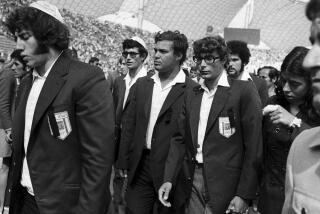U.S. Rabbi Presses Japan to Investigate Its War Crimes
- Share via
TOKYO — In a plea for international reconciliation, a Los Angeles rabbi is urging Japanese politicians to follow Switzerland’s lead in appointing a special commission to investigate World War II crimes--or risk the ongoing enmity of other Asian nations and continuing litigation in U.S. courts.
“It is in Japan’s own interest to depoliticize memory,” Rabbi Abraham Cooper, associate dean of the Simon Wiesenthal Center, said here Friday.
He was referring to the escalating historical and legal battles, here and abroad, over the extent of Japan’s wartime atrocities and the adequacy of its postwar atonement. Skirmishes are being waged between Japanese ultranationalists and peace activists, and between Japanese and foreigners, particularly Chinese and Koreans.
In U.S. courts, there is a growing campaign by victims to hold Japan accountable.
More than a dozen class-action lawsuits have been filed in the U.S. against Japanese corporations by former Allied prisoners of war, Asian slave laborers, so-called comfort women, who were dragooned as military sex slaves, and other alleged victims who demand a Japanese apology and redress. The Japanese government itself is immune from such civil litigation.
The government maintains that all World War II-related issues were settled by the 1951 San Francisco Peace Treaty. Its position was recently bolstered by Thomas S. Foley, the U.S. ambassador to Japan, who said that former POWs and others have no basis to seek reparations because the U.S. and Japan waived all claims against each other under the peace treaty.
Cooper’s remarks Friday came amid news reports that a Chinese computer hacker claimed sole responsibility for attacks on Japanese government and media computers, saying the electronic vandalism was justified by Japan’s refusal to apologize for the 1937 Nanking massacre.
In the hacker attack, the Science and Technology Agency Web site, among others, was rewritten with anti-Japanese messages and demands that Japan apologize. The incident came on the heels of a conference in Osaka of Japanese ultranationalists who sought to deny that Japanese troops had conducted mass rape and slaughters against Chinese civilians in the occupied city, now known as Nanjing, and environs.
In an unusual development, a group of Japanese legislators from five parties--including three lawmakers from the ruling Liberal Democratic Party--invited Cooper to address them on the question of Japan’s historical responsibility.
Cooper urged them to pass proposed legislation that would create a permanent bureau within the National Parliament Library to investigate and preserve documents about Japanese war crimes and restitution. The controversial bill, which would represent Japan’s first attempt to create an impartial historical record of that dark epoch, was submitted to parliament last August by the opposition Democratic Party of Japan, Japan Communist Party and Sakigake Party.
Toshiko Hamayotsu, co-president of New Komeito--part of the ruling coalition--said that the bill is being reworked to try to narrow differences with the opposition but that it isn’t clear whether it will pass. She said that, while a fact-finding investigation may lead to an apology, it is vital to separate the two issues and to first conduct an unbiased national inquiry.
“We must leave a factual record for the next generation to judge,” Hamayotsu said. “Personally, I favor an apology, but if we emphasize this, we will inhibit the process of recording the facts. If we do not thoroughly come to grips with our history, there is the possibility that it will recur.”
In 1995, then-Prime Minister Tomiichi Murayama expressed “deep remorse” for the “tremendous damage” inflicted by Japanese “aggression.” Parliament has been criticized for not following suit.
In a speech to about 100 lawmakers Thursday, and in meetings with other Japanese activists and officials, Cooper argued that Japan must choose between two competing models for managing relations with its former Asian conquests. It could, belatedly, emulate Germany’s acceptance of moral responsibility for Nazi crimes, he said, or it could find itself mired in an endless cycle of mistrust such as that between the Turks and Armenians, whose historical animosity still simmers 85 years after the 1915 massacre of Armenians under Ottoman Turkish rule.
Cooper said the Wiesenthal Center isn’t connected to the groups that seek monetary reparations for Japanese war crimes. But it favors pushing the governments of Japan, the U.S., Russia and China to release archival documents about World War II-era atrocities.
The center has lobbied Atty. Gen. Janet Reno and the Pentagon for the release of U.S. documents concerning the amnesties given to Japanese war criminals, including those who supervised Japan’s biological and chemical warfare program, in return for the data they obtained by conducting experiments on humans in the infamous Unit 731.
More to Read
Sign up for Essential California
The most important California stories and recommendations in your inbox every morning.
You may occasionally receive promotional content from the Los Angeles Times.













